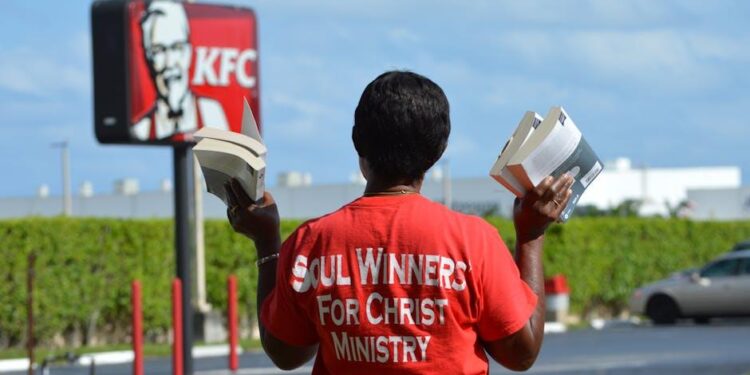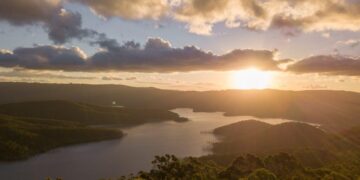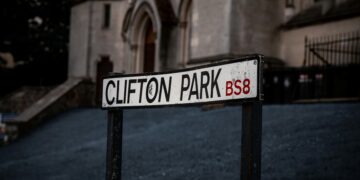Table of Contents
Introduction: A Shift in the Paranormal Zeitgeist
When Grant Wilson announced his departure from the hit television series Ghost Hunters in 2012, the news registered as more than a simple casting change.
For millions of viewers, it was a seismic event that fractured the foundation of the modern paranormal reality genre.
Wilson, alongside his partner Jason Hawes, was a co-architect of this cultural phenomenon.
Their show, premiering in 2004 on what was then the Sci-Fi Channel, had transformed paranormal investigation from a fringe hobby into mainstream entertainment.
It established a compelling and replicable formula: blue-collar authenticity (plumbers by day, investigators by night) fused with a procedural, evidence-focused methodology.1
Through their organization, The Atlantic Paranormal Society (TAPS), Hawes and Wilson became the undisputed standard-bearers in a burgeoning field.4
Wilson’s exit, therefore, was not merely the loss of a co-star; it signaled a fundamental shift in the genre he helped build.
It initiated a decade-long narrative of evolution, fragmentation, and reinvention for Wilson, Hawes, and the Ghost Hunters brand itself.
An analysis of this trajectory reveals that Grant Wilson’s departure and eventual return were not driven by any single cause, but by a complex triad of factors: the profound personal toll of reality television stardom, a growing philosophical divergence from the commercialized direction of the paranormal genre, and the strategic business maneuvers of networks and production companies vying for control of a valuable media property.
His journey offers a compelling case study in the lifecycle of a cultural phenomenon and the struggle to maintain authenticity within the machinery of the entertainment industry.
To provide a clear chronological framework for this complex narrative, the following table outlines the key milestones in Grant Wilson’s relationship with the Ghost Hunters franchise.
Table 1: Timeline of Grant Wilson’s Career with Ghost Hunters
| Date | Event | Significance | Relevant Snippets |
| Oct 6, 2004 | Ghost Hunters premieres on Syfy | Establishes Wilson and Hawes as pioneers of the paranormal reality TV genre. | 2 |
| Feb 15, 2012 | Wilson announces his departure on-air | The official start of the public narrative surrounding his exit. The episode sees a significant ratings spike. | 4 |
| May 16, 2012 | Wilson’s final episode airs | Marks the end of the original Hawes-Wilson partnership on television after eight seasons. | 5 |
| Oct 22, 2014 | Wilson returns for the 200th episode | A brief, temporary return, signaling a continued, albeit distant, connection to the show’s legacy. | 5 |
| Aug 26, 2016 | Original Ghost Hunters run concludes on Syfy | The original iteration of the show ends, paving the way for future revivals and spin-offs. | 1 |
| Jun 26, 2019 | A&E announces Ghost Hunters revival | Wilson is announced as the sole returning lead, heading a new team on a new network. | 29 |
| Aug 21, 2019 | A&E Ghost Hunters revival premieres | Wilson’s official return to television, embodying his new philosophical approach to investigating. | 5 |
| Oct 17, 2020 | A&E revival is confirmed not to be returning | Wilson’s second tenure with the show concludes after two seasons. | 30 |
| May 18, 2021 | Ghost Hunters revived on Discovery+ | The brand moves to a new platform, with Jason Hawes and the TAPS team returning, solidifying the franchise split. | 1 |
Section 1: The Departure: Unraveling the 2012 Exit
Grant Wilson’s 2012 departure from Ghost Hunters was a multi-layered event.
The public-facing narrative was one of amicable separation and personal refocus, yet a deeper analysis of subsequent interviews and behind-the-scenes context reveals a more complex picture of professional burnout and philosophical divergence.
1.1 The Public Narrative: A Coordinated and Supportive Farewell
The announcement of Wilson’s exit was presented to the public as a unified and supportive decision.
On the February 15, 2012, episode of Ghost Hunters, Wilson himself broke the news to his team and the audience, a broadcast that subsequently drew 2.2 million viewers, the show’s largest audience in 15 months.6
The official statement, which was disseminated across multiple media outlets, was concise and professional.
Wilson explained that “after enjoying nearly eight successful seasons on television, I have made the decision to leave the series in order to focus on other aspects of my personal life”.4
What is most striking about the initial announcement is the remarkable consistency and positive framing across all involved parties.
This was not a messy, contentious split played out in the media, but a carefully managed public relations event.
Wilson’s statement expressed deep affection for his colleagues and fans.6
Jason Hawes reciprocated, calling Wilson his “partner” and their collective teams and families “one big family,” emphasizing that their “longtime friendship — as well as our business partnership — will continue off-camera for years to come”.4
Mark Stern, then-president of Syfy, echoed this sentiment, praising Wilson’s “hard work, integrity, and compassion” and expressing respect for the “difficult decision”.4
The uniformity of these statements suggests a coordinated effort to preserve the integrity and commercial viability of the
Ghost Hunters brand, assuring fans that the show would continue and that the core relationships remained intact, thereby preventing a schism in the viewership.
A central pillar of this public narrative was the immense physical and personal toll of the show’s production schedule.
Team member Amy Bruni later confirmed the demanding nature of their work, stating the team was on the road for nearly 300 days a year.8
For Wilson, a husband and father of three sons, this was a significant sacrifice.
He would later elaborate that his sons were approaching their teenage years and he felt he “need[ed] to be there a little more and help them”.9
The physical exhaustion was also a major factor; in a 2017 interview, Wilson revealed that the constant travel, poor diet, and lack of consistent sleep were taking a toll on everyone involved, noting it took him “about a year and a half to start getting on a sleep schedule when I stopped filming”.11
This reason was both relatable and unimpeachable, providing a solid, personal justification for stepping away from a successful career.
The final component of the official story was Wilson’s desire to pursue his “own projects”.5
While broad at the time, this reason was quickly substantiated by his subsequent activities, lending further credibility to the public narrative of a man seeking a different, more balanced and creative life away from the pressures of weekly television.
1.2 The Professional Pivot: A Shift in Paranormal Philosophy
While the personal reasons were valid, Wilson’s later reflections reveal a deeper, more philosophical motivation for his departure.
There was a growing sense that he had accomplished what he set out to do with the show.
His initial goals were to raise awareness that help was available for people experiencing paranormal phenomena and to foster greater acceptance of the investigative field.11
By the show’s fifth season, he felt these objectives had been met, but he continued until the prospect of signing on for a ninth season prompted his final decision to leave.11
This sense of mission completion was coupled with a growing disillusionment with the direction of both the show and the paranormal genre it had spawned.
In interviews conducted years after his departure, Wilson expressed a feeling of creative stagnation, describing the work as “kicking a dead horse, and not teaching anything new [about paranormal theory]”.2
More pointedly, he became critical of the broader paranormal television landscape, which he believed had “lost its Way.” He lamented that “money and fame have taken over” and that very little of what was being presented on television was “sincere”.13
This suggests his departure was not just about burnout, but about a crisis of professional conscience.
He was uncomfortable with the commercialization and potential insincerity of the genre he had helped create.
This dissatisfaction led to a desire to return to what he termed “proper investigation”.13
He missed the methodology TAPS employed
before their television fame, where an investigation was not constrained by a production schedule.
The show, by necessity, presented a “preliminary investigation,” but Wilson yearned for the ability to stay with a family “until all is resolved”.13
This highlights a fundamental conflict between the authentic practice he valued and the logistical and narrative demands of producing a reality television series.
His departure can thus be seen as a principled stand, an attempt to reclaim the integrity of his work from the constraints of its media format.
1.3 Beneath the Surface: Speculation, Rifts, and Production Pressures
While the official narrative was one of harmony, discussions within fan communities and anecdotal reports point to a more complex and potentially contentious reality.
These unofficial accounts, though often speculative, provide crucial context for understanding the full scope of the separation.
A recurring theme in these discussions is the idea of “behind the scenes shenanigans”.14
One Reddit user, identifying as a former journalist who had interviewed Wilson, claimed that Wilson was “wildly unhappy” with this aspect of the production and “decided he’d had enough”.14
The same source alluded to Wilson’s discomfort with Jason Hawes’s conduct on the road, suggesting a conflict between Wilson’s devout Christian values and the lifestyle that came with television fame.14
Other fan theories echoed this, speculating that Wilson may have left because he “didn’t want any part of” what was happening off-camera.14
The influence of the production company, Pilgrim Media Group, is another area of fan speculation.
One user pointed out that the company would edit approximately 70 hours of investigative footage down to a 42-minute episode, with the cast having no control over the final product.15
This lack of creative input could easily have contributed to Wilson’s feeling that the show was losing its sincerity.
Furthermore, the
Ghost Hunters brand was not without its legal troubles, including lawsuits over the show’s original concept, which underscores the high-stakes business environment surrounding the franchise.16
The most compelling evidence of a deeper rift lies in the subsequent actions of Wilson and Hawes.
Despite the public declarations of enduring friendship, their professional paths diverged sharply.
They sold the Spalding Inn, a haunted hotel they had co-owned.14
Fans noted they stopped appearing together at paranormal conventions, a staple of their public-facing partnership.14
The ultimate confirmation of a professional split came years later with the launch of two competing television shows.
When A&E Network sought to reboot
Ghost Hunters, they first approached Hawes, who declined when the network insisted on recasting the team.
This led Hawes to create Ghost Nation on the Travel Channel with other TAPS veterans.
The network then offered the Ghost Hunters reboot to Wilson, who accepted.14
This sequence of events makes it clear that the separation was far more than a simple desire to spend more time with family; it was a fundamental parting of professional ways.
Section 2: The Hiatus Years (2012-2019): Life After Ghost Hunters
Grant Wilson’s seven-year hiatus from full-time television was not a period of quiet retirement.
Instead, he embarked on a series of creative and entrepreneurial ventures that allowed him to pursue his passions on his own terms, all while maintaining a strategic connection to the paranormal world and the legacy he had co-created.
2.1 The Entrepreneur and Artist: Forging a New Path
Almost immediately after his final episode aired, Wilson’s new career path became clear.
He fully invested himself in Rather Dashing Games, a tabletop game company he co-founded with Mike Richie, taking on the roles of Vice President and Art Director.4
This was a significant professional pivot.
In interviews, he passionately discussed the company’s creative process and its mission to encourage families to turn off the television and engage with one another through games.13
Wilson was deeply involved, contributing to game development and creating artwork for a slate of four or more games per year.13
This venture represented a move toward a more tangible and controlled form of creativity, a stark contrast to the often repetitive and externally managed world of reality TV.
Simultaneously, Wilson devoted time to his other artistic pursuits.
A lifelong musician, he composed and released instrumental piano music, including the albums “1.618” and “Liquid Earth”.20
He also performed with his alternative music band, Carpetshark, which included his wife Reanna.5
His creative drive also extended to the literary world.
He spoke of his work on a high-fantasy novel series titled “The Chronicles of the Unquiet,” a project he had been developing since he was a teenager.24
He also continued to co-author books related to the paranormal, including both non-fiction accounts and fictional thrillers.13
This flurry of activity underscores that his departure from
Ghost Hunters was fueled not by a lack of ambition, but by a desire to channel his creative energy into projects where he had direct artistic control and could explore different facets of his identity beyond that of a paranormal investigator.
2.2 A Brief Return: The 200th Episode and the Enduring Legacy
Two years into his hiatus, Wilson made a noteworthy, albeit temporary, return to the show that made him famous.
In October 2014, he appeared as a special guest for the two-hour 200th episode of Ghost Hunters.5
This was a pivotal moment, publicly demonstrating that despite his formal departure, he was not entirely estranged from the franchise.
The appearance was a strategically significant act of brand maintenance for all parties.
For the show and the Syfy network, Wilson’s presence lent an air of historical significance and legitimacy to the milestone episode, celebrating the show’s history and honoring its foundational partnership.
For Wilson, it was a way to reconnect with the massive fanbase, reinforce his role as a co-creator of the legacy, and keep his name prominently associated with the Ghost Hunters brand.
This move subtly reinforced the “we’re still family” narrative, even as the professional paths of Wilson and Hawes were clearly diverging.
It was a mutually beneficial engagement that preserved the value of the brand while allowing Wilson to remain a relevant figure in the paranormal community, a position that would prove valuable when the opportunity for his own reboot arose.
2.3 The Hawes-Wilson Dynamic: A Friendship Under Strain?
The public relationship between Grant Wilson and Jason Hawes during the hiatus years can be characterized as a study in contrasts.
On one hand, they maintained a supportive public front.
In a 2016 interview, Wilson discussed his upcoming guest appearance on Hawes’s new radio show, Beyond Reality Radio, stating he was “excited for him” and that he “couldn’t turn him down” when asked to be the first guest.13
This public display of camaraderie suggested that their personal friendship, which began long before their television fame, endured.
On the other hand, the business of the paranormal was driving a clear wedge between them.
Their professional partnership dissolved, evidenced by the sale of their jointly owned business, the haunted Spalding Inn 14, and their absence from the paranormal convention circuit as a D.O.14
The most definitive proof of their professional separation was the schism that led to the creation of two competing television franchises built from the TAPS legacy.
When A&E sought to revive the
Ghost Hunters brand, their initial offer to Hawes was contingent on him leading a new team.
Hawes refused, choosing instead to launch Ghost Nation on the Travel Channel with his established team of TAPS alumni, including Steve Gonsalves and Dave Tango.1
Subsequently, the production company offered the
Ghost Hunters reboot to Wilson, who accepted the opportunity to return to television at the helm of the iconic show, but with a new crew of his own choosing.14
This development, coupled with fan discussions of lawsuits over branding and titles 14, illustrates that their separation involved complex business and intellectual property disputes.
The “family” narrative, while perhaps personally true, could not withstand the pressures and opportunities presented by two distinct media careers built upon the same foundation.
Section 3: The Return: Reclaiming the Ghost Hunters Mantle
In 2019, seven years after his departure, Grant Wilson returned to television to lead a reboot of Ghost Hunters on the A&E network.
This comeback was not merely a return to form; it was a deliberate and mission-driven effort to evolve the show’s methodology and “course-correct” a genre he felt had lost its Way.
3.1 Timing and Motivation: Why Now?
Wilson’s decision to return was precipitated by shifts in both his personal and professional life.
The primary personal catalyst was a new chapter in his family life.
He consistently stated that he had left the original series to be present for his three sons during their teenage years.9
By 2019, his children were older and more independent.
As he reflected, his youngest son, who was just one year old when the show began, was now 16.2
With his parental duties having evolved, the demanding travel and production schedule of a television show was once again a manageable proposition.9
Professionally, Wilson felt a renewed sense of purpose and obligation.
During his hiatus, he had watched the paranormal television genre—the very field he had helped popularize—proliferate and, in his view, degrade.
He expressed concern that the genre was “drifting” and going “just to the left of center”.12
He was critical of new shows that seemed to be “in it for the gimmick” and treated potential spirits like “circus animals” for the sake of entertainment.2
This perception created a sense of responsibility.
He felt the need to “get my voice back out there” and “put this thing back on the rails a little bit”.27
His return was framed as a mission to reintroduce the core principles of humanity, education, and sincere investigation back into the mainstream paranormal conversation.
3.2 A New Vision: Evolving the Paranormal Investigation
The A&E revival was explicitly designed to be an evolution of the original Ghost Hunters format.
Wilson articulated a clear philosophical shift in the show’s primary objective.
Whereas the original series often focused on the fundamental question of “is it haunted or not?”, the new iteration’s goal was more profound: “helping people”.28
The mission was no longer simply to collect evidence of the paranormal, but to understand the narrative behind the activity and use that information to bring peace and resolution to both the living clients and the entities themselves.2
This new vision placed a heavy emphasis on humanity over horror.
Wilson stressed that the reboot was “not about freaking yourselves out, or creepiness, and graveyards, it’s about people”.2
This translated into a more nuanced approach to evidence analysis.
For example, instead of merely capturing an Electronic Voice Phenomenon (EVP) and presenting it as a success, the new team would attempt to analyze its content for clues about the entity’s gender, emotional state, or even nationality—digging for information that could help resolve the situation.28
This evolution also extended to the team’s technical toolkit.
Wilson made a point of moving away from what he termed “garage tech”—devices built specifically to “catch a ghost,” which he argued carried an inherent confirmation bias.2
Instead, the new show would prioritize equipment used by professionals in other fields for reliable data collection, such as TriField EMF meters and ambisonic audio recorders, which capture 3-D soundscapes.
He also stated a reduced reliance on video evidence, acknowledging its susceptibility to manipulation.2
This represented a conscious effort to re-establish a more rigorous and scientifically grounded methodology for a genre that had become saturated with sensationalized gadgets.
3.3 A New Team for a New Era
Grant Wilson’s return to Ghost Hunters was a solo venture from the original TAPS leadership.
He assembled a completely new team, a decision necessitated by the fact that his former partners had already embarked on their own television projects.
In interviews, he explained that the original team had “divided and conquered,” with Amy Bruni and Adam Berry starring in Kindred Spirits and Jason Hawes, Steve Gonsalves, and Dave Tango launching Ghost Nation.9
While he maintained that these former colleagues were “like family,” he also stated that their new shows were “not quite what I wanted to do,” signaling a clear divergence in investigative philosophy.9
The team he handpicked for the A&E revival reflected his new, more holistic vision for the show.
Rather than assembling a crew of solely paranormal investigators, he chose individuals with diverse, real-world expertise that could be applied to a case.
The team included Daryl Marston, a contractor with an intimate knowledge of building structures; Kristen Luman, a hypnotherapist skilled in dealing with trauma and loss; Mustafa Gatollari, a journalist and historical researcher; and Brandon Alvis, a tech specialist with a focus on methodological integrity.9
Wilson’s wife, Reanna, also joined the production as a producer.2
This multidisciplinary approach was designed to move beyond simply documenting phenomena and toward a deeper understanding of the human and environmental factors at play in each case, perfectly aligning with the show’s new mission to “help people.”
Section 4: Analysis and Conclusion: The Legacy of Grant Wilson’s Journey
The trajectory of Grant Wilson’s career, marked by his departure from, hiatus, and eventual return to Ghost Hunters, provides a compelling lens through which to analyze the evolution of paranormal reality television.
His journey is a narrative defined by a persistent tension between personal principles and the powerful forces of the entertainment industry.
4.1 The Duality of the Narrative: Public Persona vs. Industrial Reality
The story of Grant Wilson’s relationship with Ghost Hunters is a quintessential example of the duality between a managed public persona and the underlying industrial reality of television production.
The 2012 departure was framed as a wholly amicable, personal decision—a narrative of a family man choosing his children over fame.
The coordinated statements from Wilson, Hawes, and the Syfy network were a masterclass in brand management, designed to protect the value of the Ghost Hunters franchise and prevent a schism in the loyal fanbase.4
However, the industrial reality that unfolded in the subsequent years tells a different story.
The sale of shared business assets, the cessation of joint public appearances, and, most significantly, the launch of two separate, competing paranormal franchises helmed by the original founders reveal a professional partnership that had irrevocably fractured.1
This demonstrates how, in successful reality television, the brand itself can become an asset so valuable that it transcends and ultimately reshapes the personal relationships and original missions upon which it was built.
The “family” narrative, while perhaps emotionally sincere, could not contain the divergent business interests and philosophical disagreements that arose from years of commercial success.
4.2 Impact on the Paranormal Television Landscape
The “Ghost Hunters effect” on paranormal television is undeniable, and Grant Wilson’s career arc is central to that impact.
The show’s initial success created a template that was widely imitated, leading to a market saturation that Wilson himself grew to critique.13
His 2012 departure created a power vacuum and arguably accelerated the genre’s drift toward the more sensationalist style he would later return to correct.
His 2019 comeback with a rebooted
Ghost Hunters on A&E was a direct attempt to steer the genre back toward a more humanistic and methodical approach.12
The simultaneous existence of his show and Jason Hawes’s
Ghost Nation created a fascinating schism in the landscape, offering viewers two distinct philosophical flavors that both stemmed from the same TAPS origin.
This fragmentation illustrates the genre’s evolution from being dominated by a single, monolithic entity to becoming a diverse and sometimes contentious ecosystem of competing methodologies and on-screen personas.
The brand’s subsequent move to Discovery+ with Hawes and the TAPS team returning to the helm further solidifies the idea of “Ghost Hunters” as a modular media property, adaptable to different networks and different configurations of its iconic cast.1
4.3 Final Assessment: A Career Defined by Passion and Principle
Ultimately, Grant Wilson’s journey is a testament to the challenge of maintaining authenticity in a field inherently prone to commercialization.
His decisions—to leave a hit show at the peak of its popularity, to spend years pursuing more personal creative endeavors, and to return with a mission to reform the genre—can be seen as a consistent, if complex, effort to navigate the conflict between his core principles and the demands of the industry.
His career reflects an ongoing struggle to balance the roles of family man, artist, entrepreneur, and paranormal investigator.
While the ghosts he hunted provided the on-screen drama, the defining narrative of his career has been this persistent, off-screen quest to stay true to his foundational passion for paranormal investigation in a world that constantly sought to reshape it for mass consumption.
Works cited
- Jason Hawes – Wikipedia, accessed July 28, 2025, https://en.wikipedia.org/wiki/Jason_Hawes
- Ghost Hunters: Grant Wilson On Updating a Paranormal Classic | Den of Geek, accessed July 28, 2025, https://www.denofgeek.com/culture/ghost-hunters-grant-wilson/
- Jason Hawes & Grant Wilson – Journey Into The Unknown | SciFiAndTvTalk’s Blog, accessed July 28, 2025, https://scifiandtvtalk.wordpress.com/2009/04/16/jason-hawes-grant-wilson-journey-into-the-unknown/
- Grant Wilson leaving ‘Ghost Hunters’ – UPI.com, accessed July 28, 2025, https://www.upi.com/Entertainment_News/TV/2012/02/16/Grant-Wilson-leaving-Ghost-Hunters/83641329430949/
- Grant Wilson – Wikipedia, accessed July 28, 2025, https://en.wikipedia.org/wiki/Grant_Wilson
- Grant Wilson Saying Goodbye to Ghost Hunters in May – TV Guide, accessed July 28, 2025, https://www.tvguide.com/news/ghost-hunters-wilson-exit-1043485/
- ‘Ghost Hunters’ investigator Grant Wilson exits – Entertainment Weekly, accessed July 28, 2025, https://ew.com/article/2012/02/16/ghost-hunters-grant-wilson-leaving/
- Grant Wilson’s final episodes of Ghost Hunters – ScareHouse, accessed July 28, 2025, https://scarehouse.typepad.com/scarehouse/2012/04/grant-wilsons-final-episodes-of-ghost-hunters.html
- ‘Ghost Hunters’: It’s Back to Make a Believer Out of You (VIDEO) – TV Insider, accessed July 28, 2025, https://www.tvinsider.com/805785/ghost-hunters-returns-ae-grant-wilson/
- Hi! I’m Grant Wilson from Ghost Hunters. I’m heading back out into …, accessed July 28, 2025, https://www.reddit.com/r/Paranormal/comments/cqe6kv/hi_im_grant_wilson_from_ghost_hunters_im_heading/
- Hunting for the Truth with Grant Wilson – Ubiquitous Horror, accessed July 28, 2025, https://ubiquitoushorror.wordpress.com/2017/10/05/hunting-for-the-truth-with-grant-wilson/
- ‘Ghost Hunters’ Grant Wilson Hoping to Scare Up New Generation of Viewers | Next TV, accessed July 28, 2025, https://www.nexttv.com/blog/ghost-hunters-grant-wilson-hoping-to-scare-up-new-generation-of-viewers
- Grant Wilson talks reunion with Ghost Hunters Jason Hawes on Beyond Reality, and a Rather Dashing update – Paranormal Pop Culture, accessed July 28, 2025, https://www.paranormalpopculture.com/2016/08/grant-wilson-talks-reunion-with-ghost.html
- Are Jason and Grant still friends? : r/GhostHunters – Reddit, accessed July 28, 2025, https://www.reddit.com/r/GhostHunters/comments/16qba6p/are_jason_and_grant_still_friends/
- Why “ghost hunting” shows fail, in my opinion. : r/Paranormal – Reddit, accessed July 28, 2025, https://www.reddit.com/r/Paranormal/comments/162pz7/why_ghost_hunting_shows_fail_in_my_opinion/
- 9th Circuit Resurrects ‘Ghost Hunters’ Lawsuit | Courthouse News Service, accessed July 28, 2025, https://www.courthousenews.com/9th-circuit-resurrects-ghost-hunters-lawsuit/
- Suit over ‘Ghost Hunters’ concept reinstated – SFGATE, accessed July 28, 2025, https://www.sfgate.com/business/article/suit-over-ghost-hunters-concept-reinstated-2372520.php
- Okay… what is really up with Jay and Grant and everything in between? : r/GhostHunters – Reddit, accessed July 28, 2025, https://www.reddit.com/r/GhostHunters/comments/x9pkg9/okay_what_is_really_up_with_jay_and_grant_and/
- Grant Wilson and Rather Dashing Games; an inspiration for family game night, accessed July 28, 2025, https://basilandsalt.com/2013/02/06/grant-wilson-and-rather-dashing-games-an-inspiration-for-family-game-night/
- Grant Wilson – Apple Music, accessed July 28, 2025, https://music.apple.com/us/artist/grant-wilson/646245147
- Grant Wilson – Ghost Hunters Cast – A&E, accessed July 28, 2025, https://www.aetv.com/shows/ghost-hunters/cast/grant-wilson
- CarpetShark & Grant Wilson: No More Rumors – YouTube, accessed July 28, 2025, https://www.youtube.com/watch?v=HBaKNTvI1nI
- Grant Wilson & CarpetShark at Char’s June 25th 2012 – YouTube, accessed July 28, 2025, https://www.youtube.com/watch?v=qDaCIisPAUM
- Ghosts Past, Present, and Future with Grant Wilson – Carl Hose – WordPress.com, accessed July 28, 2025, https://carlhose.wordpress.com/2015/10/18/ghosts-past-present-and-future-with-grant-wilson/
- Ghost Town | Book by Jason Hawes, Grant Wilson, Tim Waggoner – Simon & Schuster, accessed July 28, 2025, https://www.simonandschuster.com/books/Ghost-Town/Jason-Hawes/9781451613827
- en.wikipedia.org, accessed July 28, 2025, https://en.wikipedia.org/wiki/Grant_Wilson#:~:text=The%20May%2016%2C%202012%2C%20episode,aired%20on%20October%2022%2C%202014.
- Ghost Hunters: Paranormal Expert Grant Wilson is Back (Season 1) | A&E – YouTube, accessed July 28, 2025, https://m.youtube.com/watch?v=ZTXL1wP5Oi4&pp=ygUMI2pheWFuZGdyYW50
- How The Ghost Hunters Reboot Compares To The Original, According To Grant Wilson, accessed July 28, 2025, https://www.cinemablend.com/television/2478504/how-the-ghost-hunters-reboot-compares-to-the-original-according-to-grant-wilson
- Ghost Hunters TV Show Is Getting A Revival With Original Star | Cinemablend, accessed July 28, 2025, https://www.cinemablend.com/television/2475754/ghost-hunters-tv-show-is-getting-a-revival-with-original-star
- List of Ghost Hunters episodes – Wikipedia, accessed July 28, 2025, https://en.wikipedia.org/wiki/List_of_Ghost_Hunters_episodes
- Ghost Hunters (TV series) – Wikipedia, accessed July 28, 2025, https://en.wikipedia.org/wiki/Ghost_Hunters_(TV_series)
- Grant Wilson to Depart From Syfy’s GHOST HUNTERS, accessed July 28, 2025, https://www.broadwayworld.com/bwwtv/article/Grant-Wilson-to-Depart-From-Syfys-GHOST-HUNTERS-20120216
- A&E Announces Return of GHOST HUNTERS With Grant Wilson – Broadway World, accessed July 28, 2025, https://www.broadwayworld.com/bwwtv/article/AE-Announces-Return-of-GHOST-HUNTERS-With-Grant-Wilson-20190626
- [Trailer] “Ghost Hunters” Returning to A&E in August With Reboot Series Starring Grant Wilson! – Bloody Disgusting, accessed July 28, 2025, https://bloody-disgusting.com/tv/3569493/trailer-ghost-hunters-returning-ae-august-reboot-series-starring-grant-wilson/
- Make sure you tune into the new season of Ghost Hunters! (FCL August 14th), accessed July 28, 2025, https://www.firstcoastnews.com/article/news/local/first-coast-living/make-sure-you-tune-into-the-new-season-of-ghost-hunters-fcl-august-14th/77-f495c2e4-ce76-4fad-8641-fd7ac94ec9cb






